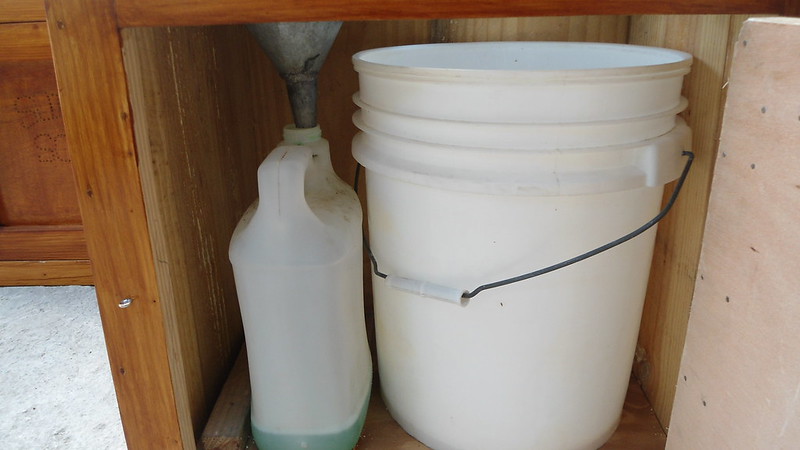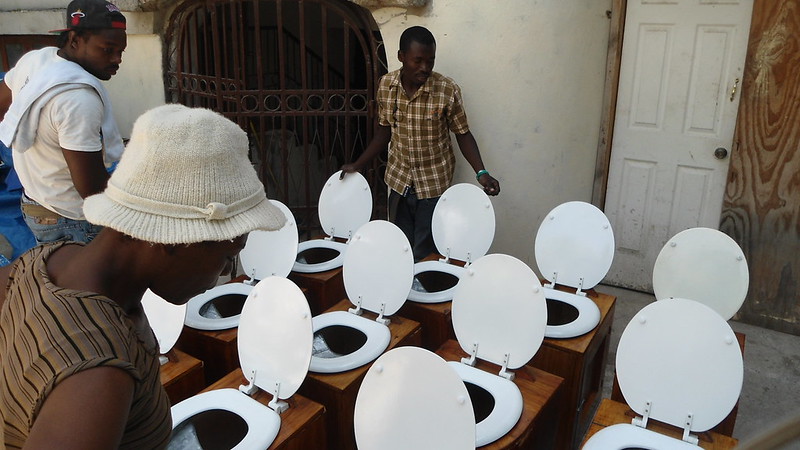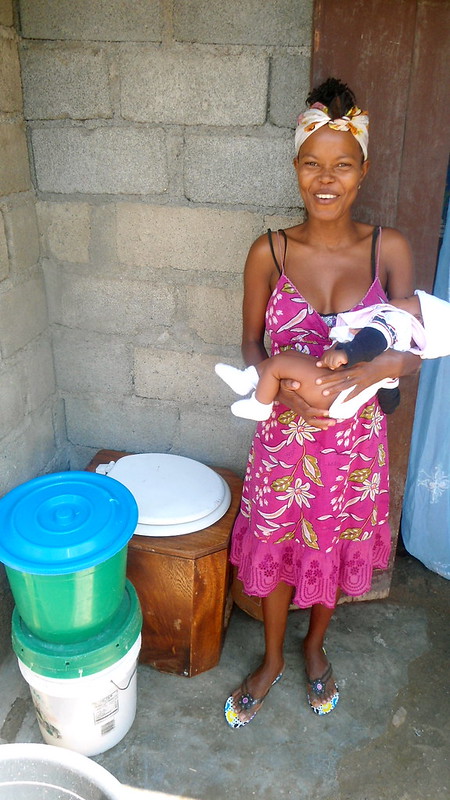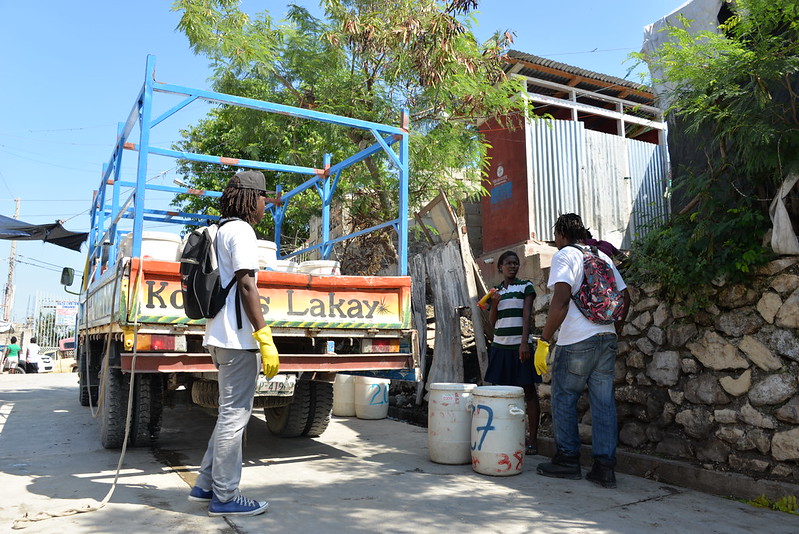- Forum
- categories
- Sanitation systems
- Toilets without urine diversion
- Container-based, mobile or bag-based toilets
- Update on SOIL's work in Haiti (social business model with mobile UDDTs, composting and reuse)
Update on SOIL's work in Haiti (social business model with mobile UDDTs, composting and reuse)
11.6k views
- Elisabeth
-
- User is blocked
- Freelance consultant since 2012
Less- Posts: 3372
- Karma: 54
- Likes received: 932
Re: Publication on SOIL's household CBS service, EkoLakay
Thanks to our Cranfield student collaboration, we now do have such a Wikipedia article which is great!P.S. I am still hoping that in the not too distant future we will also have a Wikipedia article on container based sanitation. Anyone keen to collaborate on this?
Here it is: en.wikipedia.org/wiki/Container-based_sanitation (further inputs and improvements are very welcome! See also this thread on the forum where you can comment: forum.susana.org/component/kunena/198-wi...ner-based-sanitation)
Nick, I have made a reference to your paper in the Wikipedia article now, with regards to costs, please take a look if you agree.
However, I had to use the 20 USD figure per month from the paper. In your forum post you said you can now do it at 12 USD per month per household. Do you have a new reference that we could use to quote for this figure?
Regards,
Elisabeth
Freelance consultant on environmental and climate projects
Please Log in to join the conversation.
You need to login to reply- Elisabeth
-
- User is blocked
- Freelance consultant since 2012
Less- Posts: 3372
- Karma: 54
- Likes received: 932
Re: Publication on SOIL's household CBS service, EkoLakay
Thanks a lot for posting your publication here (I have moved your post into this existing thread).
It is so welcome to see honest and detailed figures about the operating costs of a CBS (container based sanitation) system!
E.g. in the paper you said:
On a per household basis the monthly cost of the service is approximately 20 USD, this cost includes toilet provision, transport and waste treatment. With customers paying a 4-5 USD monthly service fee and compost sales per household equaling roughly 1.60 USD per month, SOIL is currently able to cover an estimated 30% of the overall costs of the service, from toilet provision through waste treatment.
The size of your project is currently:
As of March 2016, Ekolakay serves 721 households, or 4000 users, in Port-auPrince
and Cap-Haïtien, and demand for the service continues to grow.
Thank you also for pointing out the challenges which I would herewith like to bring to the attention of the Forum readers:
Challenges
• Monthly Payment Collection: Monthly fees are collected by EkoLakay agents via door-to-door visits, which require significant staff time and costs. Customers regularly struggle saving money for collection day, so multiple visits are often required and face to face interactions with clients increases payment rates.
• Container Collection: SOIL has successfully increased density within priority service areas, but low priority zones grandfathered in and characterized by a low density of clients have a higher per household expense of waste collection.
• Data Management System: While the number of clients has increased four-fold in the last 2 years, SOIL continues to rely on an ever-increasing database of separate spreadsheets to collect and manage related information ranging from payments, bucket quantities, maintenance requests, and
marketing and sales information. This system is user-intensive, frequently redundant, and illequipped to deal with the quantity of relational data we collect.
• Household Identification: Customers are often located in dense informal housing settlements. As new clients are signed on to the EkoLakay service, they are identified by a GPS point and a member of the collection team is present to develop a more qualitative understanding of location. Servicing of the individual households currently relies heavily upon the memory and intuition of the collection team members, which will become infeasible at scale.
• Sourcing of cover material: Ecological toilets are dependant on a reliable source of organic matter to serve as a cover material in the toilets and a bulking agent in the composting process. The sourcing of this material can be challenging as there are many competing uses for organic materials. As such this constitutes a significant challenge for expansion and should be considered carefully as part of the scale up plan.
Regards,
Elisabeth
P.S. I am still hoping that in the not too distant future we will also have a Wikipedia article on container based sanitation. Anyone keen to collaborate on this?
Freelance consultant on environmental and climate projects
Please Log in to join the conversation.
You need to login to replyAttached here is a briefing paper that was presented this summer at the WEDC Conference. It gives an updated overview and analysis of SOIL's household toilet service, EkoLakay, that is currently being offered in Port-au-Prince and Cap-Haitien, Haiti. This paper includes initial numbers from early 2016 regarding the cost of the service per household, which we noted would change drastically as we continue to refine and optimize our service. Since the writing of this paper, this per household monthly cost has been revised to close to 12USD.
We are happy to answer questions that SuSanA readers may have, and we will continue to share updates/papers coming out of our work in Haiti when they are available.
SOIL Team
Director of Strategy, SOIL
Haiti: 011-4-733-8104
US: 541-326-7845
This message has an attachment file.
Please log in or register to see it.
Please Log in to join the conversation.
You need to login to replyRe: New Photos from SOIL's work in Haiti (social business model with mobile UDDTs, composting and reuse)
The toilet models SOIL uses continue to evolve in an iterative process that incorporates consideration of user feedback, maintenance needs, and cost at every point. The EkoLakay toilet model that we’re currently using costs us less than $50 USD to construct (built by local contractors out of locally available materials) and has received high reviews for appearance, ease of use, and ease of maintenance. Ultimately as an organization we’re agnostic about the design as long as it’s low cost, beautiful (aspirational), and user approved.
An inside look at one of SOIL's popular wooden toilet models:

Website: www.oursoil.org
Facebook: www.facebook.com/SOILHaiti
Twitter: @SOILHaiti.
Please Log in to join the conversation.
You need to login to replyRe: Update on SOIL's work in Haiti (social business model with mobile UDDTs, composting and reuse)
Thanks for your support!
Leah, SOIL Development Director, This email address is being protected from spambots. You need JavaScript enabled to view it.





See the full album at www.flickr.com/photos/gtzecosan/sets/72157649095544877/
Website: www.oursoil.org
Facebook: www.facebook.com/SOILHaiti
Twitter: @SOILHaiti.
Please Log in to join the conversation.
You need to login to replyRe: World Water Week Forum on Resource Recovery through Social Business Models (experiences from SOIL in Haiti)
It’s no secret that here at SOIL, we love poop and its resource potential. The creation of compost, and the revenue it generates, is an essential component of EkoLakay, SOIL’s household toilet social business pilot.
Fortunately, we’re not alone in our appreciation. This year’s World Water Week, one of the world’s largest events focused on water, sustainability, and development, featured a session on “Sanitation Business Models for Safe Resource Recovery and Reuse.” SOIL was honored to be among the presenters in this jam-packed session about current research and practices in the efforts to transform human waste into something safe, useful, and profitable.
SOIL, represented by acting Operations Director Nick Preneta, was one of five sanitation social businesses from around the globe that presented during the session. Nick gave an overview of the EkoLakay service, and the lessons SOIL has learned from the early stages of our pilot.
There were several interesting conclusions from the session. First, it recognizes the numerous challenges in creating self-sustaining social businesses in sanitation. No one has yet been able to create a full cycle sanitation system that is completely self-sustaining without waste treatment subsidies (for example, from the government), so we should celebrate making any part of the cycle profitable and keep working towards complete sustainability. It also emphasizes the need to invest in business and management training, as it is difficult to attract highly-skilled business people to a low-margin sector like sanitation. Finally, it highlights the importance of the ongoing work of SOIL and other practitioners in field-testing solutions and understanding – or creating – a market for end-products like compost.
Visit this link for video of the presentation.
See the presentation file here:
Please log in or register to see it.
Website: www.oursoil.org
Facebook: www.facebook.com/SOILHaiti
Twitter: @SOILHaiti.
This message has an attachment file.
Please log in or register to see it.
Please Log in to join the conversation.
You need to login to replywww.oursoil.org/press-release-soil-co-fo...preneur-of-the-year/
Website: www.oursoil.org
Facebook: www.facebook.com/SOILHaiti
Twitter: @SOILHaiti.
Please Log in to join the conversation.
You need to login to replyHow It Works
Potential customers in this pilot project are offered two different toilet options: a private household toilet or a communal toilet where up to four families share a key to a semi-private toilet. There are now over 2,500 people accessing a SOIL toilet through this system. Monthly toilet user fee payments of approximately $5 USD per toilet began in June 2013 and early results give a promising indication that families are willing and able to pay for sanitation services.
Prior to SOIL providing sanitation services in these communities, the majority of people did not have access to sanitation and were forced to practice open defecation or use “flying toilets” (plastic bags often thrown into waterways or the ocean). Now SOIL’s customers are reporting that they are very happy with their new toilets and they also report feeling safer (as they do not need to go out at night to find a place to go to the bathroom) and healthier.
Growing Demand
SOIL believes that this low monthly user fees can cover the full cost of waste collection and toilet maintenance at a low break even point, but one of the most critical tests of whether this scale up of sanitation services will work is whether or not people are willing to pay for sanitation services. The exciting news from the Cap-Haitien SOIL Sanitation Team this week is that demand for toilets continues to greatly outpace supply. The wait list for SOIL toilets in Cap-Haitien is currently over 575 families long and more and more people are signing up everyday.
SOIL hopes to build 3,000 household and communal toilets around Cap-Haitien over the next three years – providing sustainable sanitation access to more than 22,000 people! Overtime as the monthly toilet fees cover the costs of waste collection, we plan to spinoff this component of our service to sanitation-sector social entrepreneurs that can help ensure that SOIL’s toilets are there for the long-term while also providing stable economic development in the community and producing hundreds of thousands of gallons of rich, organic compost for agriculture and reforestation.
It’s pretty amazing what can be accomplished with a toilet!
Photo Updates from Cap-Haitien
Visit SOIL’s Flickr page to see a slideshow of toilet photos!
Thanks To The Following Partners for Helping to Make This Project Possible
Konbit Sante
Grand Challenges Canada
re.Source Sanitation
KOSS
Clinton Bush Haiti Fund
Inter-American Development Bank
This is a summary of a recent post from the SOIL website. See the original and sign up for SOIL's newsletter here .
Website: www.oursoil.org
Facebook: www.facebook.com/SOILHaiti
Twitter: @SOILHaiti.
Please Log in to join the conversation.
You need to login to reply- Forum
- categories
- Sanitation systems
- Toilets without urine diversion
- Container-based, mobile or bag-based toilets
- Update on SOIL's work in Haiti (social business model with mobile UDDTs, composting and reuse)







